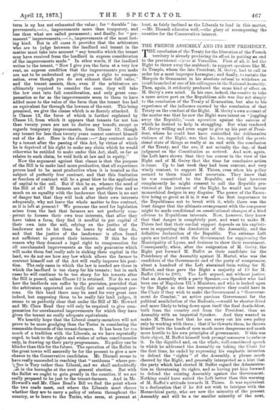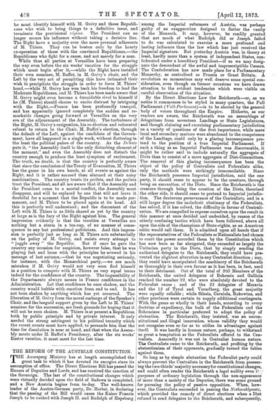THE FRENCH ASSEMBLY AND ITS NEW PRESIDENT.
THE conclusion of the Treaty for the liberation of the French territory is already producing its effect in putting an end to the provisional niginze at Versailles. First of all, it led the Right to throw away the scabbard; to support speakers like M. du Temple, whom the late President, M. Grdry, had to call to order for a most improper harangue ; and finally, to sustain the Marquis de Grammont in his absolute refusal to withdraw an insult launched at one of his colleagues in the National Assembly. Then, again, it evidently produced the same kind of effect on M. Gre.vy's own mind. In his case, indeed, the resolve to take a more active part on the Republican side was due not simply to the conclusion of the Treaty of Evacuation, but also to his experience of the influence exerted by the conclusion of that Treaty on the conduct of the Right. M. Grevy's own account of the matter was that he saw the Right were intent on " juggling away the Republic,"—an operation against the success of which he desired to help in struggling. But what rendered M. Grevy willing and even eager to give up his post of Presi- dent, where he could best have controlled the deliberative violence of the Right, was that he, too, regarded the provi- sional state of things as really at an end with the conclusion of the Treaty, and the eve, if not actually the day, of final judgment on the Constitution as arrived. And now, again, the Left have shown that they too concur in the view of the Right and of M. Grevy that the time for conclusive action is come. Up to last week they had been content, and very wisely content, to support M. Thiers, even when his policy seemed to them timid and uncertain. They knew that he was committed to the Republic, and that however complacently he might consent to call the Republic pro- visional at the instance of the Right, he would not favour monarchical designs in any disguise. The power of the Execu- , tire being so great as it is, it was of the first importance to I the Republicans not to break with it, while there was the least danger that the ultimate arrangement with the conqueror might be made conditional on constitutional changes of a kind adverse to Republican interests. Now, however, they know that that danger is completely past, and want to make M. Thiers feel that their cordial support depends on his explicit- ness in supporting the dissolution of the Assembly, and the definitive declaration of the Republic. The extreme Left again are irritated with the Government for suppressing the Municipality of Lyons, and desirous to show their resentment. Consequently, when, after the resignation of M. Gr6vy, the ' Right put forward M. Buffet as their candidate for the Presidency of the Assembly against M. Martel, who was the candidate of the Government and of the party of compromise, about a hundred of the Left abstained from voting for M. Martel, and thus gave the Right a majority of 19 for M. Buffet (304 to 289). The Left argued, not without justice, that an Assembly with a party Speaker,—a Speaker who had been one of Napoleon III.'s Ministers, and who is looked upon by the Right as the best representative they could have in the Chair if they wish to make the Government a " Gouverne- ment de Combat," an active partisan Government for the political annihilation of the Radicals,—would be shorter-lived and more likely to bring down upon itself the final death-blow, both from the country and from the President, than an Assembly with an impartial Speaker. And they wanted to make M. Thiers feel that he can carry out his own policy only by working with them ; that if he thwarts them, he throws himself into the hands of men much more dangerous and much more hostile to his own principles of government. If this was their object, M. Buffet himself took prompt measures to enforce it. In the dignified and, on the whole, well-considered speech in which he addressed the Assembly on taking the Chair for the first time, he ended by expressing his emphatic intention to defend the " rights " of the Assembly, a phrase much cheered by the Right, and generally interpreted as a hint that the party which had elected M. Buffet regard the Administra- tion as threatening its rights, and as having put him forward to defend the existing Assembly against the Government. Nothing could have suited the Left better than this warning of M. Buffet's attitude towards M. Thiers. It was equivalent to a declaration that if he did not wish to intrigue with the Monarchical party, who are now the minority of the present Assembly and will be a far smaller minority of the next, he must identify himself with M. Grevy and those Republi- cans who wish to bring things to a definitive issue, and terminate the provisional rtgime. The President can no longer secure his influence without taking a decisive line. The Right have a majority over .the mere personal adherents of M. Thiers. They can be beaten only by the hearty co-operation of these with the convinced Republicans,—the Republicans who fight for a cause, and not merely for a man.
While thus all parties at Versailles have been preparing the way even before the six weeks' vacation for the struggle which must begin after it,—while the Right have installed their own nominee, M. Buffet, in M. Grevy's chair, and the Left by the very act of permitting this have intimated their wish to precipitate the struggle in order to force M. Thiers' hand,—while M. Grevy has won back his freedom to lead the Moderate Republicans, and M. Thiers has been made aware that M. Grevy might even become a formidable rival to himself if he (M. Thiers) should choose to excite distrust by intriguing with the Right,—France has been profoundly tranquil, and has apparently ignored completely the sudden and re- markable changes going forward at Versailles on the very eve of the adjournment of the Assembly. The turbulence of the Right, M. Grevy's resignation, his re-election and reiterated refusal to return to the Chair, M. Buffet's election, through the default of the Left, against the candidate of the Govern- ment, have all happened in a single week, without fluttering in the least the political pulses of the country. As the De'bots puts it, " the Assembly itself is the only disturbing element of the moment," and even the Assembly does not disturb the country enough to produce the least symptom of excitement. The truth, no doubt, is that the country is perfectly aware that since the conclusion of the Treaty of Evacuation, M. Thiers has the game in his own hands, at all events as against the Right, and it is rather amused than alarmed at their noisy machinations. The country trusts its prefets, and the prefets trust the President, and all are aware that if the Assembly and the President come to a mortal conflict, the Assembly must disappear, and will be replaced by one that will not leave it doubtful for a moment that the Republic is to be made per- manent, and M. Thiers to be placed again at its head. All this is perfectly well understood ; and the discontent of the Left with M. Thiers is as little shared as yet by the country at large as is the fury of the Right against him. The general impression evidently is that the troubles at Versailles are nothing but a storm in a tea-cup, of no manner of conse- quence to any but professional politicians. And this impres- sion is perfectly just so long as M. Thiers acts substantially on the policy of M. Grevy, and resists every attempt to
" juggle away " the Republic. But if once he gave the country any occasion for suspicion, however false, that he was playing fast and loose with the principles he avowed in his message of last autumn,—that he was negotiating seriously, for instance, with the Monarchical party,—we are much mistaken if M. Grevy would not very soon find himself in a position to compete with M. Thiers on very equal terms indeed for the confidence of the country. The impassibility of the Departments always means in France confidence in the Administration. Let that confidence be once shaken, and the country would bubble with emotion from end to end. It has not been shaken by anything which has yet occurred. The liberation of M. Grevy from the moral embargo of the Speaker's Chair, and the languid support given by the Left to M. Thiers' nominee for the succession, are fresh grounds for hoping that it will not be soon shaken. M. Thiers is at present a Republican both by public principle and by private interest. It only needed the strong astringent to his political tenacity which the recent events must have applied, to persuade him that the time for dissolution is near at hand, and that when the Assem- bly meets under M. Buffet's Presidency, after the six weeks' Easter vacation, it must meet for the last time.



































 Previous page
Previous page